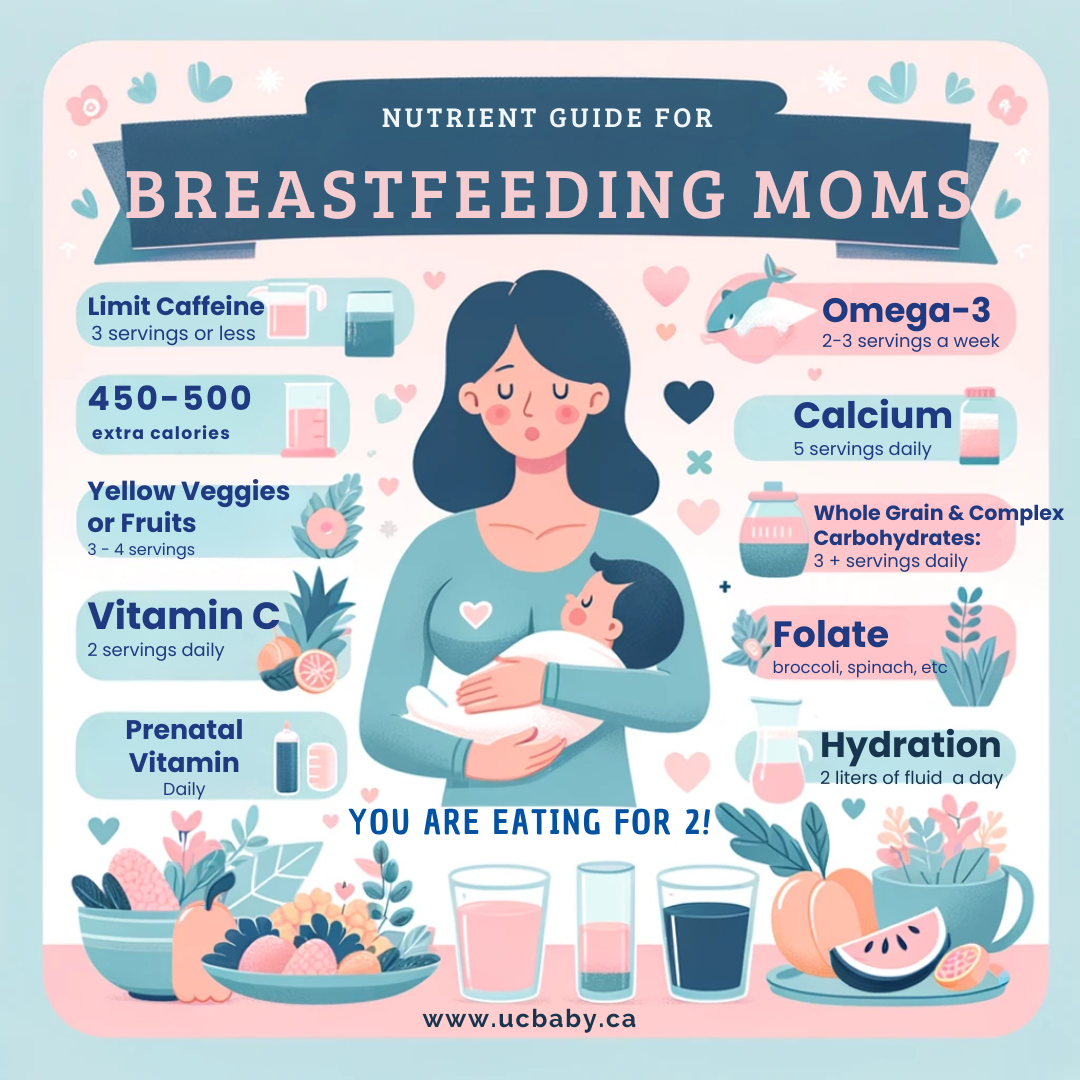Breast milk is full of nourishing nutrients and protective compounds that are essential for your baby’s development. This is why breast milk is often referred to as liquid gold.
Not shockingly, it takes a lot of energy to produce this liquid gold and to breastfeed your baby continuously. Your needs for many nutrients also increase in demand.
That’s why it’s crucial to choose nutrient-dense, nourishing foods to support your breast milk production. Plus, eating healthy postpartum food can boost your mood and make you feel good and who doesn’t want that?
Here’s how to get the right nutrition to provide your baby with a healthy liquid lunch.
What to Eat While Breastfeeding
Getting a variety of different foods is so important during breastfeeding. Not only do you get the nutrients and vitamins from different foods but your breast milk changes taste and smell when eating diverse foods. So your baby will already start to crave those healthy foods you’re eating today, in the future!
Offering a taste of the healthier stuff earlier on will also minimize the potential for pickiness, later on.
Here’s what to aim to consume each day, to ensure you’re getting the nutrients you and your baby need.
- Protein: 3 servings
- Calcium:5 servings
- Iron-rich foods: 1 or more servings
- Vitamin C: 2 servings
- Leafy Greens and Yellow Vegetables or Fruits: 3 to 4 servings
- Other Fruits and Vegetables:1 or more servings
- Whole Grain and Complex Carbohydrates: 3 or more servings
- High Fat Foods: small amounts
- Omega-3’s: 2 to 3 servings a week (to promote baby’s brain growth)
- Prenatal Vitamin: Daily

How Many Calories Do You Need When You’re Breastfeeding?
Although you can make milk on a less-nutritious diet, it doesn’t mean that you should. You’re still technically eating for two at this breastfeeding stage.
Generally, your body burns about 300-500 calories a day, but if you’re nursing it’s typically 450-500. You don’t need to anxiously track your calories each day or consume more, but definitely keep your extra-nutritional needs in mind while breastfeeding.
As long as you stayed within your doctor’s recommended weight gain during pregnancy and your postpartum weight is in normal ranges, you shouldn’t have to take in any more or less. If you aren’t sure, you can check with your practitioner.
Foods to Avoid While Breastfeeding:
For nine-months, you carefully avoided non-pregnancy-friendly foods to keep your baby safe and healthy. Of course, now that baby is here your protective instincts are most likely stronger so it’s normal to wonder if there are foods to avoid while breastfeeding.
Here’s the good news: there really isn’t a list of foods to avoid while nursing but there are foods you should limit!
- Caffeine: Caffeine is ok to consume while breastfeeding, in moderate doses. As long as you limit your intake to no more than 3 cups of caffeinated beverages a day, you and your baby will be just fine.
- High-Mercury Fish: All fish contain some mercury, a common pollutant that’s known as neurotoxin, meaning it can affect the baby’s brain. But most of the time the health benefits of eating fish outweigh the risk. Fish that contain high levels of mercury and should be eliminated from your diet are: shark, swordfish, tilefish, and king mackerel.
- Peppermint, Parsley and Sage:These 3 herbs are what’s known as antigalactagogues, meaning that in high doses they’ve been known to decrease breast milk production. So, if you notice your milk production dropping you may want to cut down on peppermint, parsley and sage, or avoid it altogether.
Breastfeeding and Water Consumption
In addition to being hungrier than usual while breastfeeding, you may feel thirstier too.
Note that your hydration needs will vary depending on factors like activity levels and dietary intake. There’s really no rule of how much fluid you need during breastfeeding but you should always drink when you are thirsty and until you have quenched your thirst.
If you are feeling tired, faint, or if your milk production is decreasing, you probably might want to drink more water.
The best way to tell you are hydrated is by the color and smell of your urine. If it’s dark yellow and has a strong smell, that’s a sign you need to drink more water.
Breastfeeding and Alcohol Consumption:
After nine months of no drinking, you presumably would like to have a glass of wine or beer – and that’s completely ok. But keep in mind alcohol can pass through breast milk into the baby’s system.
You can have alcohol but assess yourself when you drink. For instance, if you’re too drunk to drive home or act normally, you shouldn’t breastfeed.
If you’ve had a bit too much, wait until the alcohol has cleared your body before nursing. By the time your blood is free of alcohol, your milk will be too.
List of Nutrients that’s Important for You and Your Baby’s Health and Common Food Sources You’ll Find Them.
Consider taking supplements as well as finding foods enriched with these vitamins.
- Vitamin B1 (Thiamin):fish, pork, seeds, nuts, beans
- Vitamin B2 (Riboflavin): cheese, almonds, nuts, red meat, oily fish, eggs
- Vitamin B6: chickpeas, nuts, fish, poultry, potatoes, bananas, dried fruit
- Vitamin B12: shellfish, liver, yogurt, oily fish, nutritional yeast, eggs, crab, shrimp
- Choline: eggs, beef liver, chicken liver, fish, peanuts
- Vitamin A: sweet potatoes, carrots, dark leafy greens, organ meats, eggs
- Vitamin D: cod liver oil, oily fish, some mushrooms, fortified foods
- Selenium: Brazil nuts, seafood, turkey, whole wheat, seeds
- Iodine: dried seaweed, cod, milk, iodized salt
Remember, the goal is to fuel yourself with energy and that can be done by eating nourishing healthy foods! But don’t forget to indulge yourself in an unhealthy snack, or alcoholic beverage every once in a while. You deserve it!
REFERENCES:
Breastfeeding Diet 101: What to Eat While Breastfeeding
Are There Foods to Avoid While Breastfeeding?
Diet for Breastfeeding Mothers
Written by: Melissa Ureten





 Invite families and friends to witness this memorable event of your pregnancy. Celebrate that special child-bonding moment with your loved ones, wherever they are in the world.
Invite families and friends to witness this memorable event of your pregnancy. Celebrate that special child-bonding moment with your loved ones, wherever they are in the world. There is nothing more beautiful than your baby's heartbeats. Save that sound forever in a UC Baby® Heartbeat Bear®. It's not just a great keepsake, but also an effective way to sooth your baby to sleep.
There is nothing more beautiful than your baby's heartbeats. Save that sound forever in a UC Baby® Heartbeat Bear®. It's not just a great keepsake, but also an effective way to sooth your baby to sleep.